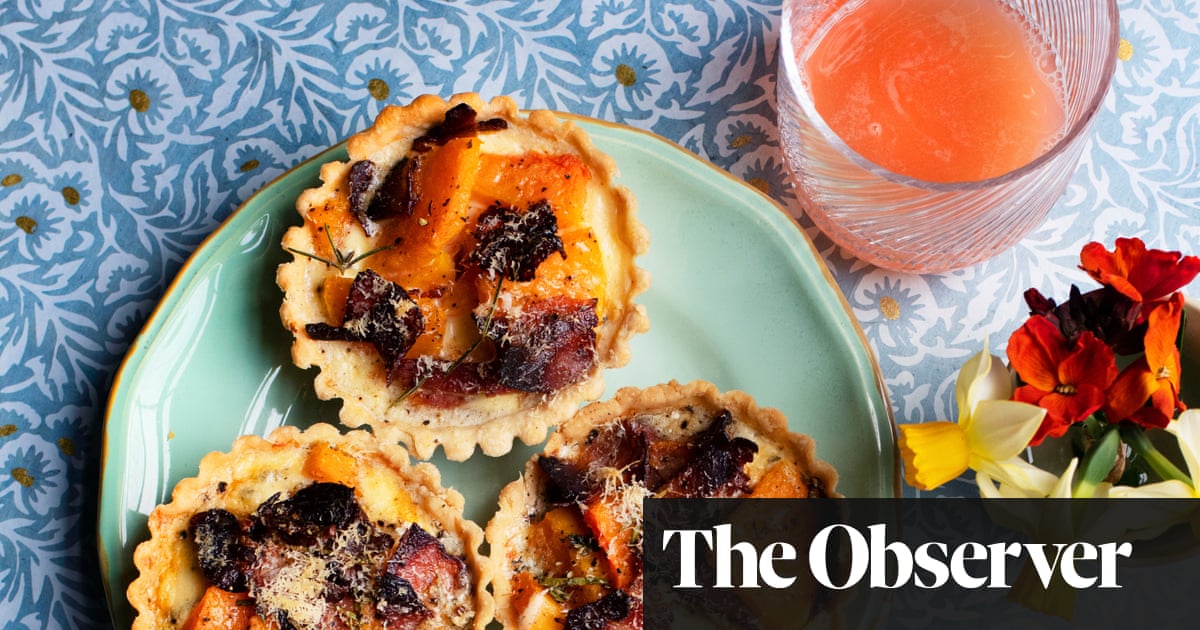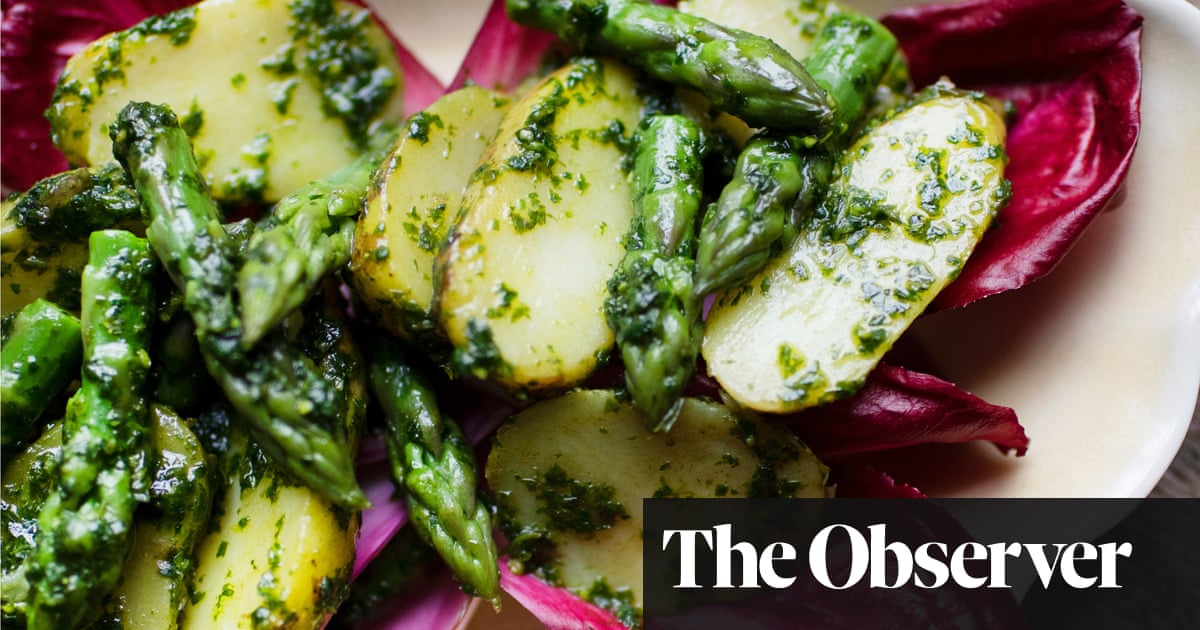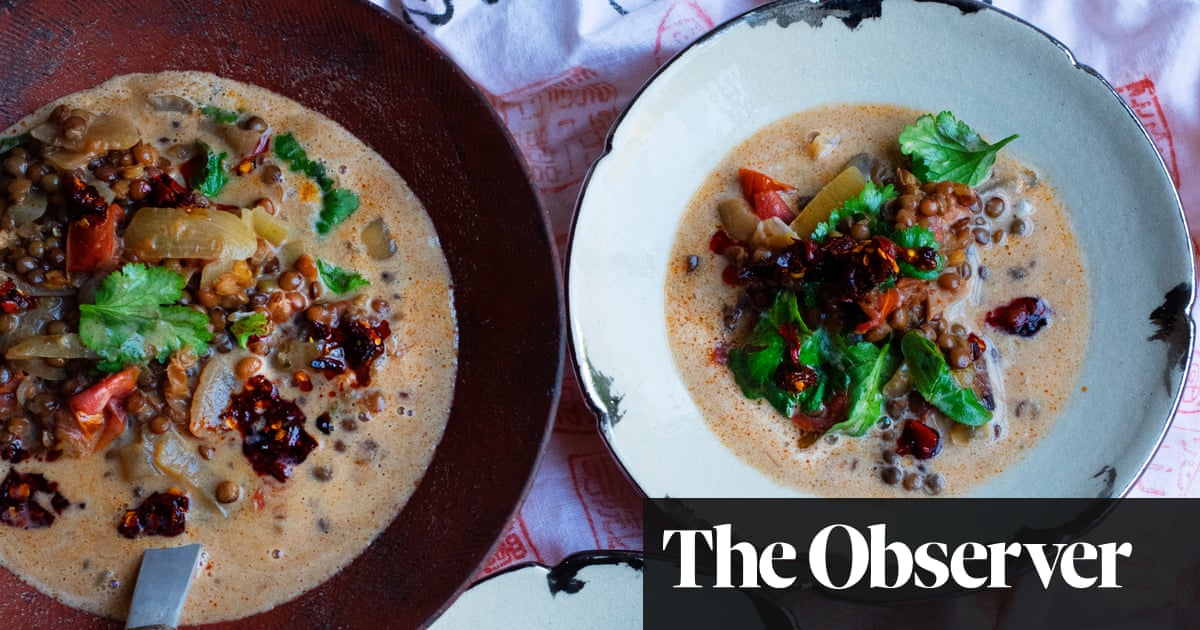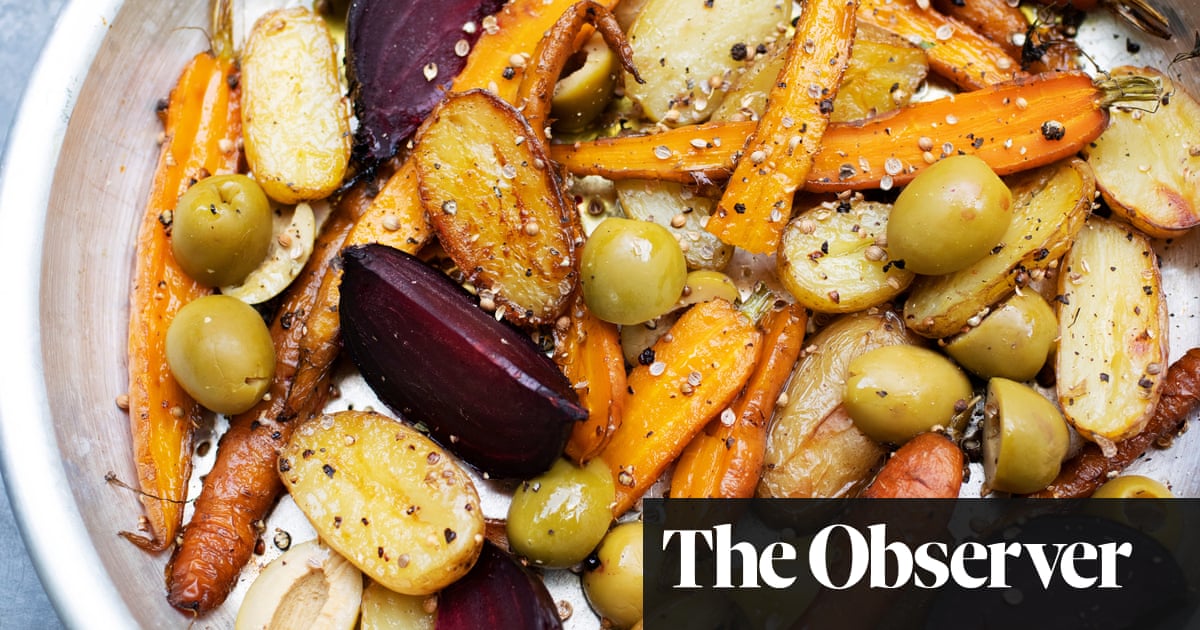
Icould bake all day. A cake for tea, a nut-freckled meringue for dessert or something soft and fruit-laden for a mid-morning break. And, if guests are around, even for breakfast. Of course, I don’t need to, but there is something deeply civilised about stopping around 10.30am for coffee and a slice of something sweet; making a big savoury flatbread for lunch, its floury surface under a pile of sweet, golden onions and cheese.
And then there is the old-fashioned – almost forgotten – treat that is afternoon tea. No matter how simple, it always feels like a special occasion. I suppose the whole notion of tea at 4pm feels like something from a slower, less frantic era. Indulgent whatever you have on your plate. In my house it is rarely more than a single slice of cake, but this is also my favourite time to entertain, to pass around plates of classic baking for all-comers. For a birthday or a visit from much loved friends I will make a fancy-schmancy cake, by which I mean something that has taken an hour or two of my time.
I am not big on eating dessert after supper, but others will feel robbed if there isn’t something sweet with which to sign off their evening meal. Ideally, it is something that will work for both dessert and a mid-morning break the following day. Some sort of meringue fits the bill (not too heavy and will keep for a day or so). A treat that can be served in thin slices with cream and fruit, or trickled with melted chocolate the next day.
Special occasion breakfast: butternut squash and crisp pancetta tarts (pictured above)
A morning treat for when friends are staying. If you can get organised the night before, these tarts can be on the table in the morning; otherwise, they make a fine light lunch. Make the pastry cases the night before, so you have only to fill and bake them first thing the next day.
Makes 6
For the pastry
butter 90g
plain flour 180g
egg yolk 1
grated pecorino 3 lightly heaped tbsp (or parmesan)
water 2-3 tbsp
For the filling
butternut squash 500g (about ½ medium)
melted butter for brushing the tart tins
pancetta 90g, thinly sliced
eggs 2
double cream 250ml
milk 50ml
rosemary leaves 2 tbsp, chopped
grated parmesan 2 tbsp, grated, to finish
You will need 6 loose-bottomed deep tart tins measuring 8cm across the base.
The night before, make the pastry. Cut the butter into small dice and rub into the flour with your fingertips until it has the texture of soft, fresh breadcrumbs. Alternatively, reduce to fine crumbs in a food processor. Add the egg yolk, the pecorino and the water, a tablespoon at a time, stopping when you are able to bring the crumbs together into a rollable dough. Wrap and chill the pastry in the fridge for 20 minutes.
Peel the butternut squash and scoop out and discard the seeds and fibres. Halve lengthways then slice into small pieces (about the thickness of a pound coin). Put the pieces of squash in a steamer basket and cook over boiling water for 7-10 minutes until tender. Remove, allow to cool and refrigerate. Set the oven at 170C fan/gas mark 5.
While the pastry rests, brush the tart tins thoroughly with melted butter. Divide the pastry into six, then roll out each piece to fit the tart tins. Line the tins with the pastry, pressing it gently into the corners. Fill each with greaseproof paper or foil and baking beans, rest for 20 minutes, then bake for 20 minutes.
Carefully remove the beans and paper and return the pastry cases to the oven for 5 minutes or until the pastry is biscuit coloured and dry to the touch. Remove and set aside till the next morning. (Once the pastry is cool, you may like to loosen them from their tins.)
The next morning, cut the pancetta into pieces the size of a postage stamp and fry in a shallow pan until crisp. Remove from heat.
Preheat the oven at 160C fan/gas mark 4. Beat together the eggs, cream and milk, then season with black pepper and the chopped rosemary leaves. Place the pastry cases in their tart tins on a baking sheet, then divide the slices of butternut and pancetta between them.
Pour in the custard, making sure none goes over the edges (it will stick the tarts to their tins) and dust the surface with the grated parmesan. Bake for 25 minutes until the custard is just set.
Remove from the oven and leave for 15 minutes or so before gently easing the tarts from their tins.
Mid-morning fika: vegan ginger and rhubarb slice
As much as I cherish the deep, caramel and liquorice notes of a classic ginger cake, I do feel a less sweet and sticky bake is called for in spring and summer. This one is a light and spicy ginger cake with ribbons of rhubarb running through the crumb. Ring the changes with apples in place of the rhubarb or, for midsummer, a couple of handfuls of gooseberries. A perfect mid-morning treat, it needs no creamy accompaniment, just a pot of coffee. Oh, and did I mention it is vegan?
Serves 12
rhubarb 250g
self-raising flour 260g
baking powder 1 tsp
ground ginger 2 tsp
dark muscovado sugar 70g
light soft brown sugar 70g
stem ginger in syrup 70g
vegetable oil 95ml
golden syrup 50ml
To finish
icing sugar
stem ginger in syrup 1-2 knobs
Preheat the oven at 160C fan/gas mark 4. Line a shallow cake tin measuring 20cm x 20cm with baking parchment.
Cut the rhubarb into short lengths (about 3-4cm), then slice each piece in half horizontally and set aside.
Put the self-raising flour, baking powder, ground ginger and both sugars together in the bowl of an electric mixer, and briefly mix to distribute the spices and raising agent among the flour. Chop the 70g of stem ginger into small nuggets about the size of a hazelnut.
Pour in the oil, golden syrup, a pinch of salt, the chopped ginger and 160ml of warm water. Mix together briefly, then pour into the tin (it will be slightly softer than the usual cake mixture so do not be alarmed). Scatter the rhubarb pieces over the surface (they will sink in the body of the cake as it cooks) and bake for 45-50 minutes till firm but spongy.
Remove from the oven and leave to cool before dusting with icing sugar and scattering with a little chopped stem ginger.
A bread for lunch: onion, thyme and parmesan flatbread
A deeply savoury bake for an informal lunch. Something to tear apart at the table. Serve with a big bowl of green leaves – watercress, lettuce and thinly sliced fennel.
Serves 4
For the flatbread
strong white flour 250g
za’atar 1 tsp
dried yeast 1½ tsp
salt ½ tsp
warm water 175ml
olive oil 1 tbsp, plus a little extra
For the topping
onions 3 medium
olive oil 3 tbsp
thyme leaves 2 heaped tbsp
parmesan 6 tbsp, grated
thyme sprigs a few
You will need a baking sheet lined with baking parchment.
In a large mixing bowl, combine the flour, za’atar, yeast and salt, then pour in the warm water and a tablespoon of the olive oil, and mix well. Knead thoroughly for about 8 minutes on a floured board, or use a dough hook and food processor (much the quicker alternative and the method I invariably use). Stop when the dough feels soft and elastic. It should be slightly sticky to the touch.
Put the dough back in the mixing bowl, cover with a clean tea cloth and leave in a warm place until it has almost doubled in size – about 45 minutes.
While the dough rises, peel the onions and cut them in half, then cut each half into six or so wedges. Warm the olive oil in a deep saucepan, stir in the onions and let them cook over a moderate heat for a good 15-20 minutes, till pale gold and translucent. Chop the thyme leaves and stir into the onions with a little salt and black pepper. When the onions are golden and sticky, stir in the grated parmesan.
Turn the dough out on to a lightly oiled baking sheet. Push the dough out with your fist into a rectangle roughly 24cm x 20cm, then spread the onion mixture over the dough, leaving a rim of about 2cm around the edges. Leave to rise for a further 20 minutes under the tea cloth in a warm place.
Preheat the oven to 180C fan/gas mark 6. Bake for 20-25 minutes or until puffed and golden.
Afternoon tea: raspberry, orange curd and passion fruit cake
A grand, special-occasion three-layer sponge cake filled and coated with a mascarpone and raspberry cream. It is best served in thin, elegant slices for a birthday tea, in which case it will serve at least 12.
You will have one thin slice of sponge left over after layering the cake. You might like to keep it in the freezer for an impromptu trifle, make it into raspberry jam sandwiches for the next day, or reduce it to crumbs and scatter it over ice-cream or yogurt.
Serves at least 12
For the cake
butter 225g
caster sugar 225g
eggs 4
self-raising flour 225g
baking powder 1 tsp
milk 2 tbsp
For the filling
mascarpone 500g
icing sugar 50g
vanilla extract ½ tsp
double cream 250ml
freeze dried raspberries 2 tbsp
orange or lemon curd 250g
To finish
passion fruit 2
raspberries a handful, for decoration
freeze-dried raspberries a little ground to a powder
You will need 2 x 18cm spring-form cake tins, the bases lined with baking parchment.
Preheat the oven to 160C fan/gas mark 4.
To make the sponge, beat the butter and sugar together till light and fluffy using a food mixer with the flat paddle beater attachment. Make sure it is really soft and fluffy, occasionally scraping down the sides of the bowl with a rubber spatula.
Break the eggs into a small bowl, mix briefly with a fork, then introduce a little at a time to the sugar and butter, mixing well between each addition. Sieve the flour and baking powder together, then incorporate into the wet mixture in three or four batches, with the beater turning slowly. Finally, mix in enough of the milk to give a consistency that will fall from the spoon with a light shake.
Divide the mixture equally between the baking tins, lightly smooth the surface, then bake for 25 minutes till the cake is risen and just coming away from the edge of the tin. Test with a metal skewer by pushing it gently into the centre of the cake; if it comes out without any raw mixture attached, then the cake is done. Remove from the oven and leave to settle for 10 minutes before carefully turning out on to a cooling rack.
When the cakes are thoroughly cool (and they really must be cool, otherwise your cream will melt), slice each one in half horizontally using a long, sharp kitchen knife to give four 18cm discs of cake. (You will only use three of these, so keep one for later.)
Make the filling. Beat together the mascarpone, icing sugar and vanilla extract. Lightly beat the cream until it stands in soft peaks, then mix into the mascarpone taking care not to overmix. (You don’t have to be too thorough, a ripple effect of the two is rather lovely.) Lightly crush the freeze-dried raspberries to a coarse powder (a pestle and mortar is good for this), then fold gently into the mascarpone cream.
Place one of the bottom halves of the cakes on a serving plate, then cover with half the orange or lemon curd. Spread a thick layer of the mascarpone cream on top. Add a second slice of cake, spread that too with orange curd and cream, then add the remaining piece of cake.
Spread the entire cake, top and sides, with the remaining mascarpone cream, making swirls on top that will hold the passion fruit seeds and juice.
Scoop the seeds and juice from the passion fruit, then spoon over the top of the cake. If you wish, decorate with a few fresh raspberries and a little more of the crushed dried raspberries.
A crisp nutty cake for after dinner – hazelnut meringue cake, blueberry sauce
A shallow cake, lightly crisp outside and chewy within, that will work for afternoon tea or dessert. It is straightforward to make but taking your time to evenly toast the nuts will be time well spent, resulting in a deeper flavour. And do try to find ready-skinned hazelnuts. Skinning your own is a bit of a bore.
Serves 6-8
hazelnuts 200g, skinned
groundnut or vegetable oil a little
eggs 2 large
egg yolk 1
vanilla extract ½ tsp
caster sugar 175g
For the blueberry sauce
blueberries 250g
caster sugar 1 tbsp
lemon juice 1 tbsp
You will need a 22cm deep-sided tart tin with a removable base.
Preheat the oven to 140C fan/gas mark 3.
Put a shallow pan over a moderate heat and scatter the skinned hazelnuts in it. Watch them carefully, shaking the pan from time to time, until they are evenly golden brown. (Don’t get distracted, they can burn in a heartbeat.) Remove from the heat and weigh out 75g. Cut these in half and set aside.
Using a food processor, grind the remaining 125g of toasted hazelnuts to a coarse powder.
Line the tart tin loosely with baking parchment and brush with a little vegetable oil.
Using a food mixer fitted with a whisk attachment, beat the eggs and extra yolk, the vanilla extract and sugar until light and fluffy. Mix in the ground nuts, then scoop into the lined tart tin. Scatter the halved nuts over the surface and bake for about 30-35 minutes till lightly crisp but spongy within. Remove from the oven and set aside to cool.
To make the blueberry sauce, put the blueberries and sugar in a small saucepan with 2 tablespoons of water and bring to the boil. When the berries start to burst and the juice turns deep purple, sharpen with the lemon juice and set aside.
When the meringue is cool, serve it straight from the paper on to plates, with whipped cream and the blueberry sauce.












